Can chickens eat bananas? Yes, chickens can eat bananas, and they offer many benefits. Bananas are a favorite snack of backyard chickens and provide an entertaining treat.
Bananas are a great source of nutrition for chickens, providing them with important vitamins and minerals. They also contain a high amount of potassium, which helps keep chickens healthy and energetic. Bananas can also help improve a chicken’s digestive system, helping break down proteins and other nutrients.
Bananas are a safe and healthy treat for chickens, but knowing when and how much to give them is important. This article will provide information on how often to feed chickens bananas, what size portions to give them, and any potential risks associated with feeding bananas.
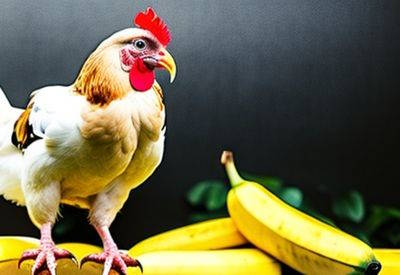
Can chickens eat bananas?
If you’ve ever wondered if chickens can eat bananas, then you’re in luck! Bananas are packed with essential nutrients like vitamins A and C, potassium, magnesium, and fiber which can all benefit your feathered friends. They also contain natural sugars that will boost energy on those lazy days.
You can feed your chicken all parts of the banana, including the peel. However, it is important to note that not all parts of the banana are edible, and any rotten parts should also be thrown away, as this could make your chicken sick.
Bananas should only be given as a treat and not as a substitute for their regular food because they are high in sugar. As such, limiting how much banana you give your chickens at one time is important.
[ChickenAffiliate]
The benefits of eating bananas for chickens
Not only are bananas delicious, but there are plenty of benefits to feeding your chickens this tasty yellow fruit. Let’s look at five reasons why adding bananas to your chickens’ diet can be beneficial.
A Natural Source of Energy
Bananas are full of natural sugars and carbohydrates that give chickens an energy boost when they need it most. When food is scarce and temperatures are low in winter, feeding your chickens fresh bananas can provide much-needed energy to keep them warm and healthy.
Rich in Vitamins & Minerals
Bananas are packed with essential vitamins and minerals that help keep your birds healthy. They contain high amounts of vitamin B6, which helps reduce stress levels in birds; vitamin C, which boosts immunity; and potassium, which helps maintain muscle health. Bananas are also rich in magnesium, iron, and calcium – all vital nutrients for healthy feathers and bones.
Help with Digestion
The natural fiber found in bananas helps aid digestion in chickens by keeping their digestive tracts moving smoothly. This means fewer digestive issues like diarrhea or constipation for your feathered friends. Plus, bananas also contain probiotics, so they can help support good gut bacteria and further aid digestion.
An Affordable Treat
Bananas don’t have to break the bank. They’re an affordable way to reward your feathered friends without spending too much on treats or supplements. Plus, since they store well at room temperature or frozen for longer periods, you don’t have to worry about buying fresh fruits every week to keep up with their dietary needs.
Fun & Delicious
Last but not least, watching your chickens enjoy a snack is just fun. Seeing them run around after pieces of banana is entertaining. Plus, it’s a great way to bond with your chickens and show them extra love.
Things to watch out for when feeding bananas to chickens
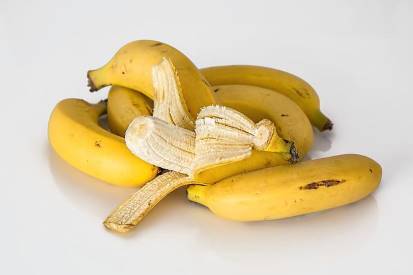
Bananas are a yummy treat for chickens, but there are some things you should know before feeding them to your feathered friends. Let’s dive into the dos and don’ts of feeding bananas to chickens.
Peel the Bananas First
Chickens don’t have teeth, so peeling any fruit or vegetable before giving it to them is best. The skin on a banana can be difficult for them to digest, so peeling it off first will help avoid any digestive issues. Plus, it makes them easier for your chickens to eat.
Don’t Feed Your Chickens Too Much Fruit
Fruits like bananas are high in sugar, which can cause weight gain and other health problems if eaten too often. A chicken’s diet should consist mainly of grains and protein-rich foods such as mealworms and grasses. Bananas can be offered as an occasional treat – no more than twice a week – but ensure you aren’t overfeeding your flock with these sugary snacks.
Cut Up the Bananas Into Bite-Sized Pieces
Bananas can be quite large compared to chickens’ small mouths, so you will want to cut them up into bite-sized pieces before offering them as treats. This will make it easier for chickens to eat the banana pieces without having difficulty swallowing or choking on larger chunks of fruit. It also helps prevent any potential digestive issues from eating too much at once.
How often should chickens eat bananas?
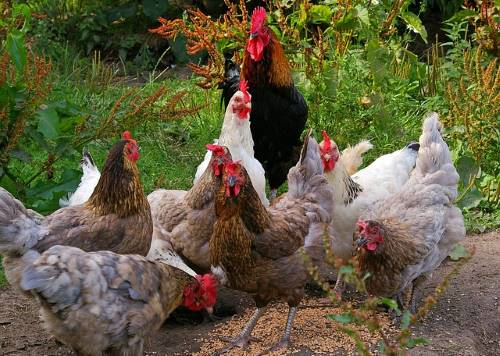
Bananas are a healthy and tasty treat for chickens with several nutritional benefits. But, it is important not to feed your poultry friends too much of this fruit as too much can cause upset in a chicken’s digestive system.
The best frequency for feeding your chickens bananas is once or twice weekly and only in small amounts. This helps ensure the bird’s digestive health while providing variety in its diet.
How to prepare bananas for feeding to chickens
Bananas are a nutritious and delicious snack for chickens. They provide essential vitamins, minerals, and antioxidants that can help support their overall health. But how do you prepare bananas for feeding your chickens? Read on to learn how to give your feathered friends a tasty treat.
Peeling Bananas for Chickens
The first step in preparing bananas is to peel them. Removing the skin makes it easier for your chickens to eat the banana without any difficulty. If you choose not to peel the banana, ensure there are no strings or pieces of skin left behind when they finish eating – these can cause digestive issues if ingested.
You can chop up the banana into smaller pieces if you wish, making it easier for your chickens to consume and digest.
Feeding Bananas Whole
You can feed it whole if you’d prefer not to peel or chop up the banana. This is especially helpful if your chickens have difficulty pecking at small pieces of food. Ensure the banana isn’t too large for them, as they may be unable to break it apart easily with their beaks.
Removing any uneaten pieces of banana from their enclosure after they’ve finished eating is also important – this will help prevent them from overeating and becoming sick.
Can baby chickens eat bananas?
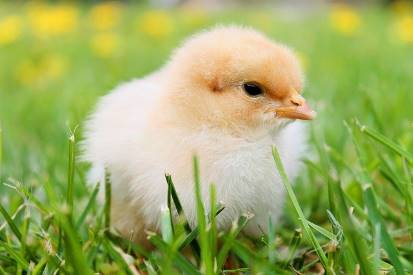
Feeding baby chickens can be tricky; you want to provide the proper nutrition, but you must keep safety in mind. Can baby chickens eat bananas? The answer is yes; however, you must bear in mind that the sugar content in bananas could give a too-rich diet for your chicks.
You can still safely feed chicks some bananas, but not as much as an adult chicken. Therefore, it’s best to introduce this fruit to your little ones in moderation and as a supplement to their regular feed.
Can chickens eat banana peels?
Whether or not you can feed your chickens banana peels is a common question, and the answer is yes! However, there are a few things to keep in mind. Firstly, ensure that the banana peels are pesticide-free if grown commercially.
Secondly, cutting them into small pieces is important as larger pieces can be difficult for chickens to digest. Boiling the peel before allowing your chickens to eat them will also help digestion.
What other fruits can chickens eat?
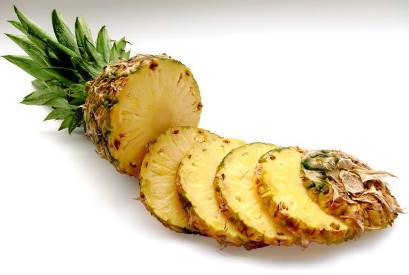
Everyone knows chickens love bananas but did you know they can enjoy many other fruits, too? If you’re looking for something new to offer your feathered friends, read on to find out what other fruits chickens can eat.
Pineapple
Pineapple is a great option for chickens. Pineapples contain vitamins and minerals like Vitamin C, calcium, and magnesium. They also contain bromelain, which has anti-inflammatory properties. To give your chickens pineapple, cut it into small pieces – make sure the pieces are small enough not to cause a choking hazard.
Read More: Can Chickens Eat Pineapple? 5 Important Benefits
Papaya
Papaya is another great fruit for chickens. Papaya contains plenty of vitamins and minerals, such as Vitamin A and potassium, and it also has digestive benefits. Make sure to cut the papaya into small pieces before giving it to your chickens.
Read More: Can Chickens Eat Papaya? 5 Fantastic Benefits
Dragon fruit
Dragon fruit is another wonderful option for your feathered friends. Dragon fruit is an exotic-looking fruit with unique flavors and textures that your chickens will love. It’s high in antioxidants and vitamins B1, B2, B3, and C. However, dragon fruit should be given sparingly since it also contains a lot of sugar – too much sugar can lead to health problems in chickens.
Read More: Can Chickens Eat Dragon Fruit? 4 Awesome Benefits
Persimmons
Persimmons are a delicious treat for chickens. Persimmons are full of energy-boosting nutrients like Vitamin A and Vitamin C and dietary fiber, which aids digestion. Remove any seeds or pits before giving them the persimmon slices to keep things safe for your chickens.
Read More: Can Chickens Eat Persimmons? 5 Amazing Benefits
Jackfruit
Jackfruit is an excellent choice when it comes to feeding your flock. Jackfruit contains Vitamins A & C and potassium, which helps with muscle growth in chicks. Before feeding jackfruit to your chickens, ensure it’s perfectly ripe (it should be slightly soft), so they can enjoy the sweet taste without discomfort.
Read More: Can Chickens Eat Jackfruit? 4 Excellent Benefits
How to give chickens a healthy and balanced diet
Like any pet parent, there’s a learning curve for keeping your chickens healthy and happy. One of the most important elements of their wellbeing is ensuring access to a healthy and balanced diet. Let’s take a look at how you can achieve that.
The Basics of Chicken Feed
When it comes to feeding your chickens, you should provide two basic types of feed – a protein source and a grain source. Protein sources can include things such as mealworms, crickets, cooked eggs, or even cooked meat.
You can offer up things like cornmeal or scratch grains (usually combinations of wheat, oats, barley, and other grains) for the grain source. Ensure that both sources provide enough nutrition for your chickens – that means providing enough protein for laying hens.
It also helps if the food is nutrient-rich (like organic feed) so that all your chickens get what they need from their diet.
Supplemental Foods for Your Chickens
In addition to their regular feed, you can also offer supplemental foods such as fresh fruits and vegetables. Apples, bananas, and berries are all great options for giving your chickens something extra in their diets.
Leafy greens like lettuce or spinach are also excellent sources of vitamins and minerals. Don’t forget about mealworms – they’re an excellent source of protein, and fun treats for your birds.
Just ensure that whatever you give them is fresh since old food carries the risk of bacteria growth, which could harm your birds’ health.
Other Considerations
It’s important to remember that chickens tend to pick out only what they like from their feed, leaving behind the rest – which isn’t ideal if they don’t get all the nutrients they need from the foods they consume in one sitting.
To help combat this issue, try offering up different kinds of food throughout the day so that they have more opportunities to choose what’s best for them, nutritionally speaking. You should also ensure that clean water is always available – this will help them stay hydrated and keep their systems functioning properly.
Can chickens eat bananas – final thoughts
Bananas can be a great treat for chickens – ensure you don’t overdo it. Bananas are a high-sugar food, so they should be given as an occasional treat. Feeding the peel is also totally safe for chickens. Make sure to chop it into small pieces and boil it if necessary.
Be sure only to feed small pieces of ripe banana that have had any rotten spots removed beforehand. With these precautions in mind, you can feel confident that your flock will enjoy their tasty snack in moderation.
Read More:
